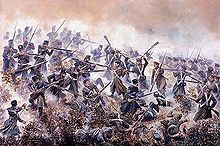Mark Walker (British Army officer)
Sir Mark Walker | |
|---|---|
 Depiction of the battle of Inkerman | |
| Born | Finea, County Westmeath, Ireland |
| Died | Arlington Rectory, Devon |
| Buried | Cheriton Road Cemetery, Folkestone |
| Allegiance | |
| Service | |
| Years of service | 1846-1893 |
| Rank | General |
| Unit | 30th Regiment of Foot 3rd Regiment of Foot |
| Battles / wars | Crimean War Second Anglo-Chinese War |
| Awards | Victoria Cross Order of the Bath |
| Relations | Sir Samuel Walker, 1st Baronet |
| Other work | Honorary Colonel of the Sherwood Foresters |
General Sir Mark Walker VC KCB (24 November 1827 – 18 July 1902) was born in Gore Port, Finea, County Westmeath in Ireland, son of Captain Alexander Walker and Elizabeth Elliott. He was an Irish recipient of the Victoria Cross, the highest and most prestigious award for gallantry in the face of the enemy that can be awarded to British and Commonwealth forces.
Victoria Cross
During the Crimean War, Walker was a 26-year-old lieutenant in the 30th Regiment of Foot (later the East Lancashire Regiment) British Army when the deed for which he was awarded the VC was performed.
On 5 November 1854 at Inkerman, Crimea, Lieutenant Walker jumped over a wall in the face of two battalions of Russian Infantry which were marching towards it. This act was to encourage the men, by example, to advance against such odds - which they did and succeeded in driving back both battalions.[1][2]
His Victoria Cross was until recently on display at The Buffs Regimental Museum, Canterbury, England. With the rest of that museum's collections, it has now been transferred to the National Army Museum, where it is not currently on display.
Later life
He was wounded by a howitzer shell during his service in the Crimea which resulted in the amputation of his right arm. He served through the Second Anglo-Chinese War of 1860 as Brigade Major. In 1881 Walker married Catherine Chichester.
He was later knighted and achieved the rank of General. He died at Arlington, Devon England on 18 July 1902.
A memorial wall plaque honoring Sir Mark is found at Canterbury Cathedral.
Personal life
His brother was Sir Samuel Walker, 1st Baronet QC, Liberal MP for Londonderry, Solicitor-General for Ireland, Attorney-General for Ireland and Lord Chancellor of Ireland
References
- ^ "No. 22149". The London Gazette. 4 June 1857.
- ^ National Army Museum
- List of Irish Victoria Cross recipients
- The Register of the Victoria Cross
- Clarke, Brian D. H. (1986). "A register of awards to Irish-born officers and men". The Irish Sword. XVI (64): 185–287.
- Ireland's VCs ISBN 1-899243-00-3 (Dept of Economic Development, 1995)
- Monuments to Courage (David Harvey, 1999)
- Irish Winners of the Victoria Cross (Richard Doherty & David Truesdale, 2000)
External links
- Use dmy dates from April 2012
- 1827 births
- 1902 deaths
- 19th-century Irish people
- Irish officers in the British Army
- People from County Westmeath
- Crimean War recipients of the Victoria Cross
- Irish recipients of the Victoria Cross
- British Army personnel of the Crimean War
- British Army personnel of the Second Opium War
- 30th Regiment of Foot officers
- British Army generals
- Knights Commander of the Order of the Bath
- Buffs (Royal East Kent Regiment) officers
- British amputees
- British Army recipients of the Victoria Cross
